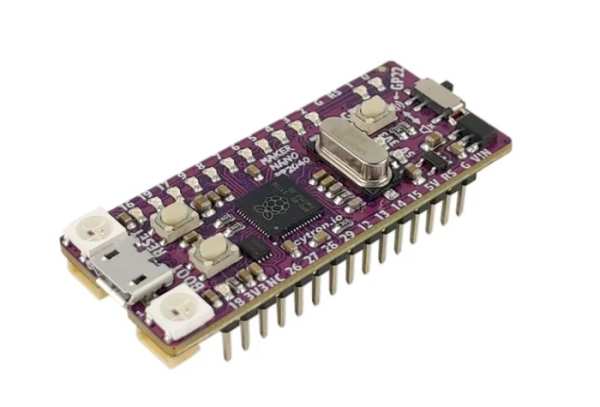If you would like to learn more about the new Arduino Maker Nano RP2040 will be pleased to know that a review has been published to the official Raspberry Pi MagPi magazine website this week by Phil King. Available to purchase for £8 or $8 depending on your location the Maker Nano RP2040, as the name suggests, features a Arduino Nano form factor and is powered by a Raspberry Pi RP2040. Providing a Dual-core Arm Cortex-M0+ processor together with 264KB internal RAM, 2MB of Flash memory the same specifications as the Raspberry Pi Pico.

Other features of the Maker Nano RP2040 small board which measures just 49.53mm x 21.08mm in size include support for the Arduino IDE, CircuitPython and MicroPython. Together with 14x Status indicator LEDs for GPIOs, 1x Piezo buzzer with mute switch, 1x Pushbutton, 2x RGB LEDs (WS2812 Neopixel) and 2x Maker Ports, compatible with Qwiic, STEMMA QT, Grove (via conversion cable).
Arduino Maker Nano RP2040
“Slightly shorter than a Pico, this board has 30 pre-soldered pins, all helpfully labelled on the silkscreen. While the pinout is very similar to the Arduino Nano’s, there are four (12-bit) analogue inputs rather than eight (10-bit). Some digital GPIO pins are numbered differently too. A pair of reset pins are linked to a handy reset button on the top, where there’s also a boot button – held to attach the board as a USB drive to a computer – and a programmable button linked to GPIO pin 20.”
“On either side of the micro-USB port are two RGB NeoPixel LEDs. Since both are linked to GPIO 11, they can’t be controlled separately, but some cool colour-changing effects can be achieved. In addition, 14 of the digital pins have tiny blue status LEDs that may well prove useful when troubleshooting I/O connections for circuits. Primitive audio is also provided in the form of a piezo buzzer that can be muted with a slide switch. It can be programmed to play beepy tunes by sending numerical note values.”
“8/10 A well-designed microcontroller board with a familiar Arduino form factor, the power of RP2040, and cool bonus features.”
For the full Arduino Maker Nano RP2040 review jump over to the Raspberry Pi magazine website by following the link below.
Source: Arduino Maker Nano RP2040 $8 board reviewed
